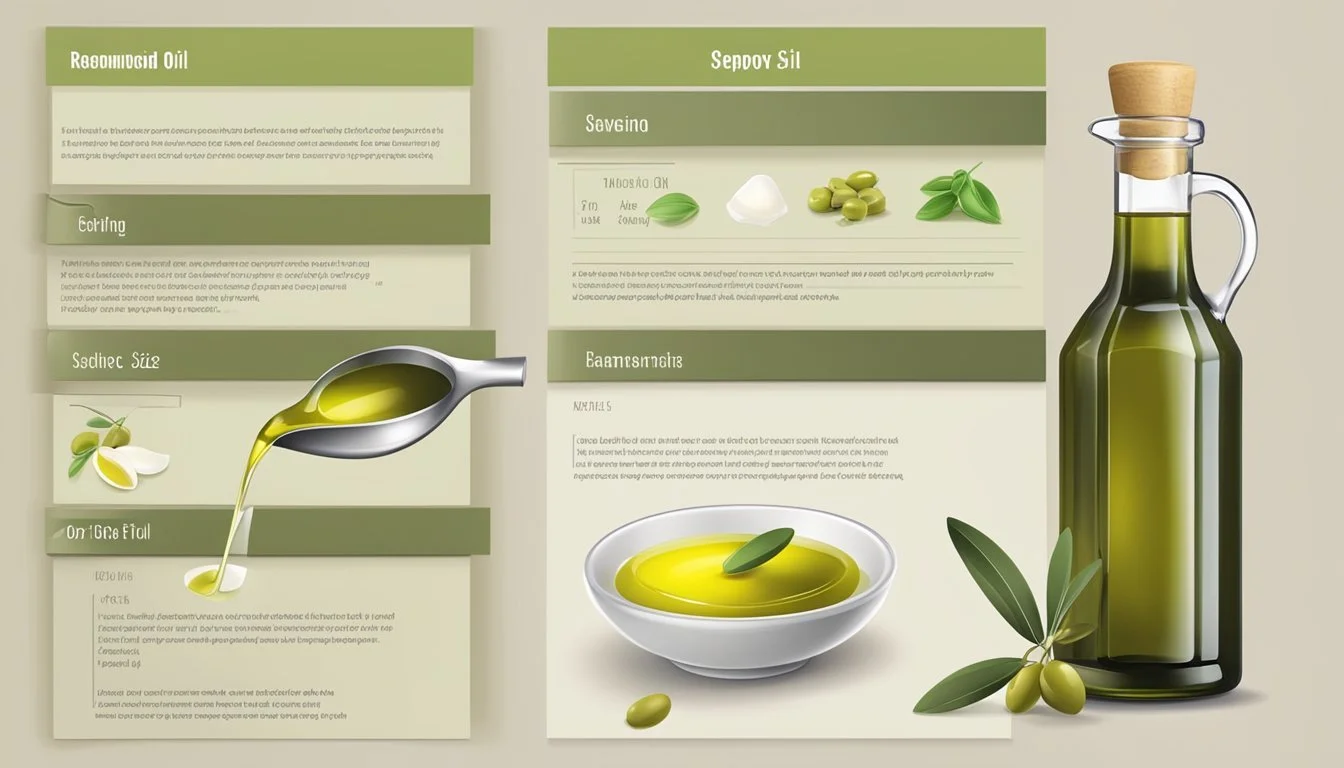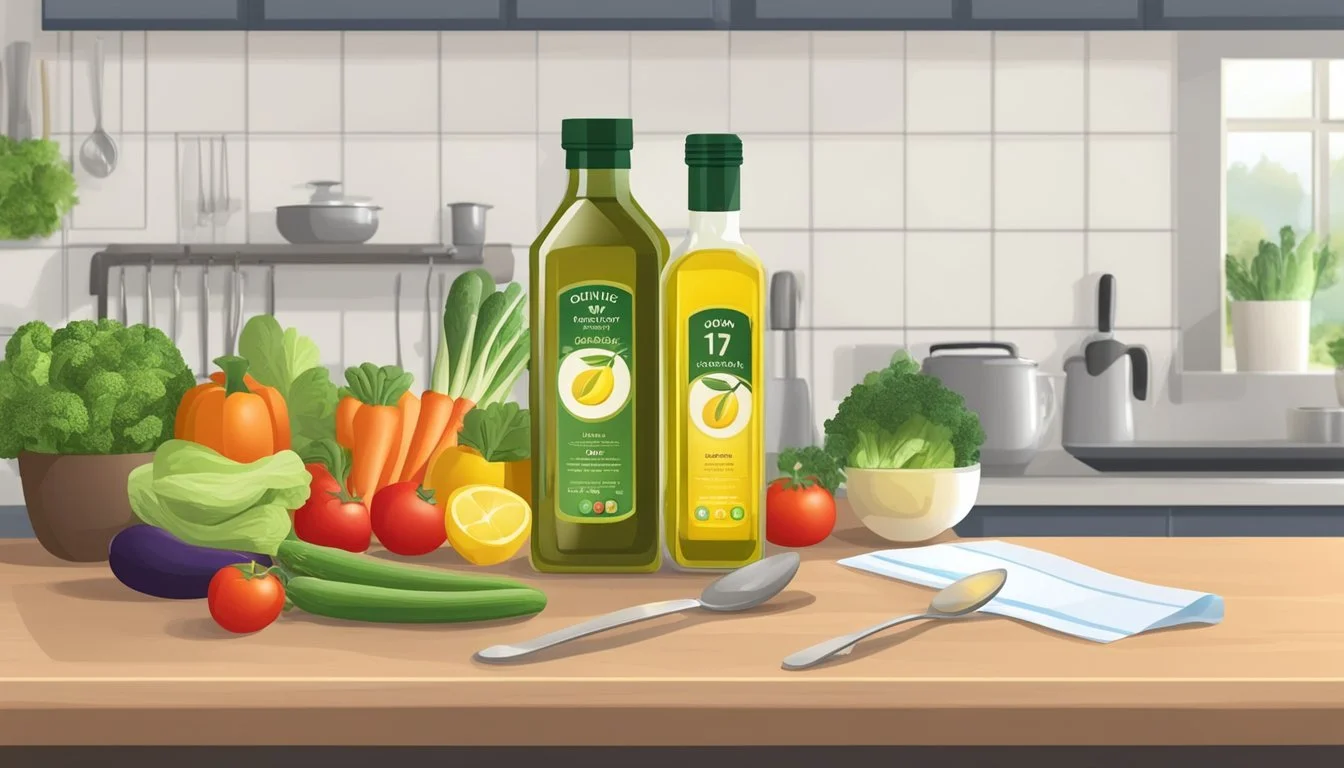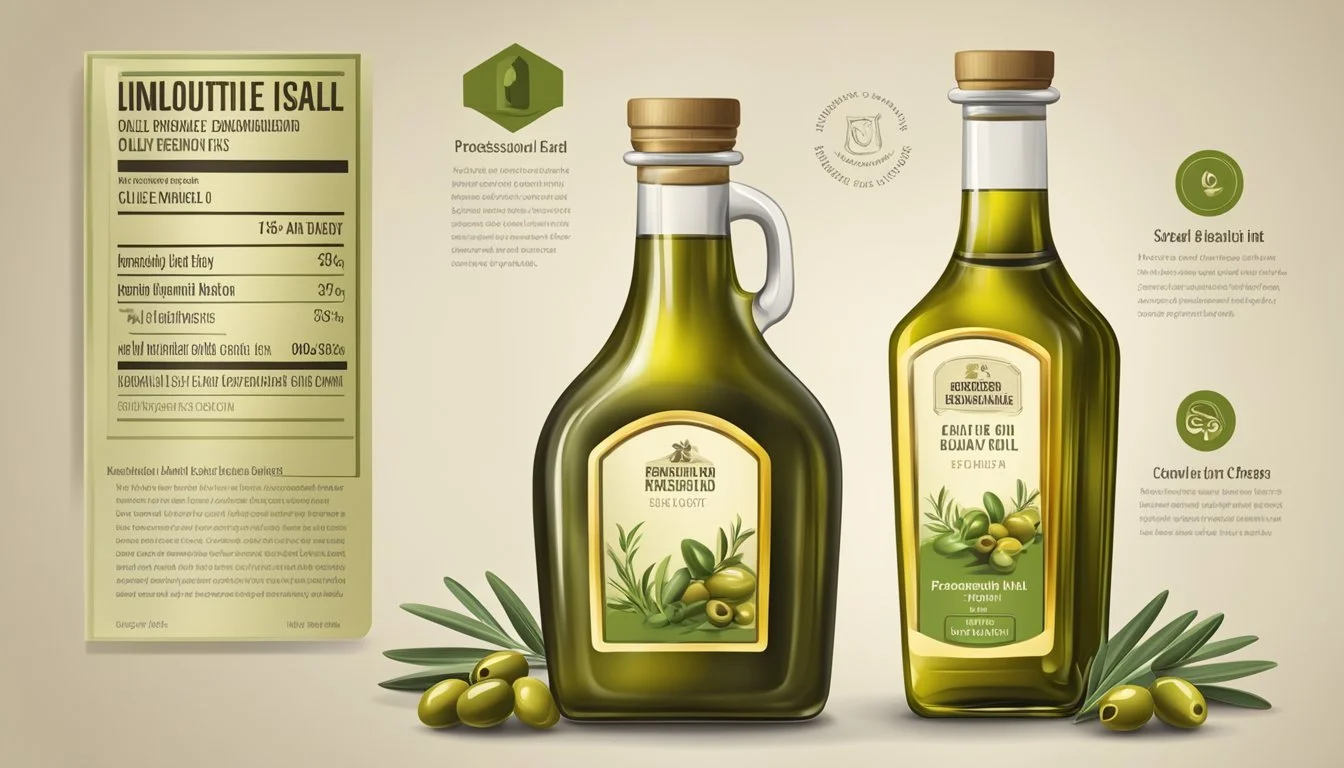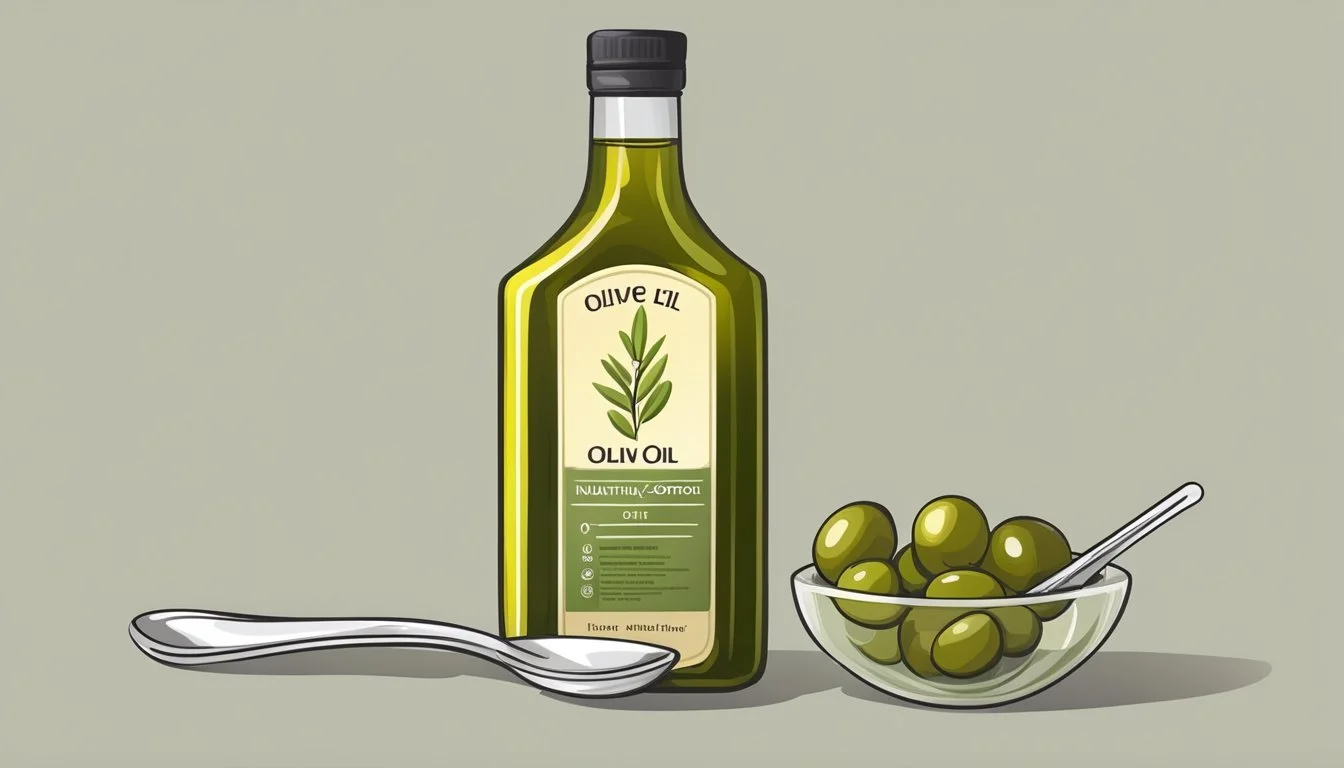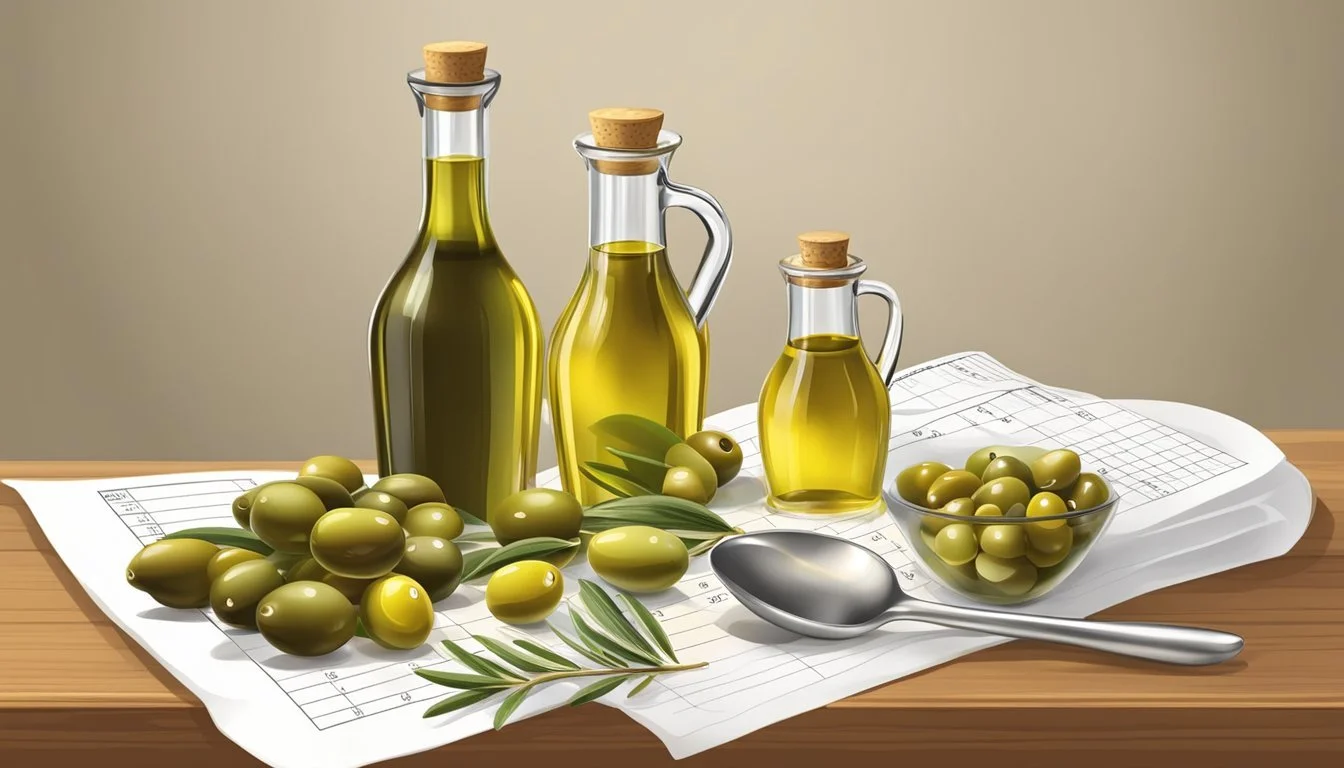How Much Olive Oil Is Healthy to Consume Daily?
Unveiling Optimal Intake Guidelines
Olive oil is a central component of the Mediterranean diet and is renowned for its health benefits, particularly its heart-healthy monounsaturated fats. These fats are crucial as they can help reduce the risk of heart disease when they replace saturated fats in the diet. The United States Food & Drug Administration (FDA) suggests that consumption of about 1.5 tablespoons (approximately 20 milliliters) of oils high in oleic acid, such as olive oil, may reduce the risk of coronary heart disease. This is under the condition that it replaces fats and oils higher in saturated fats and does not increase the total number of calories one eats per day.
Consuming olive oil in moderation is key to reaping its health benefits without exceeding daily caloric needs. Some studies suggest that using olive oil as approximately 14 percent of a day's calorie intake, which aligns with about 2 tablespoons, is generally safe and beneficial. This quantity has been associated with positive outcomes, such as higher bone density and a decreased risk of type 2 diabetes in individuals who consume more than a tablespoon daily.
It's important to note that while olive oil is healthier than many alternative fats and has been linked to various benefits, including potentially reducing the likelihood of cancer, it is still a calorie-dense food. Therefore, it should be consumed in accordance with an individual's overall dietary requirements to maintain a balanced diet and healthy lifestyle.
Nutritional Profile of Olive Oil
Olive oil is a rich source of monounsaturated fatty acids and contains a balanced mix of both saturated and unsaturated fats, along with beneficial antioxidants that contribute to its health-promoting properties.
Unsaturated vs. Saturated Fats
Olive oil contains predominantly monounsaturated fat, specifically oleic acid, accounting for up to 73% of its total oil content. Monounsaturated fats are considered heart-healthy because they can help reduce harmful cholesterol levels and are linked to lower inflammation. In contrast, saturated fats—comprising a smaller portion of olive oil—are often linked to increased levels of LDL (bad) cholesterol. The dietary focus is usually on reducing saturated fats in favor of unsaturated fats for better heart health.
Antioxidant Composition
The antioxidant profile of olive oil is impressive, offering a range of compounds like polyphenols. Antioxidants such as vitamin E, squalene, and various phenolic compounds confer stability to the oil and provide health benefits. These compounds can help protect the body against oxidative stress, which is implicated in numerous chronic diseases. High-quality extra virgin olive oil is particularly rich in these antioxidants, contributing not just to the flavor but also to the oil's health-promoting characteristics.
Health Benefits
Olive oil, particularly rich in monounsaturated fats, offers numerous benefits for overall health when consumed in moderate daily amounts.
Heart Health
Regular consumption of olive oil can lead to improved heart health. The FDA suggests that consuming 1.5 tablespoons of oleic acid-rich oils, such as olive oil, in place of saturated fats may reduce the risk of coronary heart disease. It does so by helping to maintain healthy cholesterol levels, potentially lowering LDL (bad cholesterol) and preserving or raising HDL (good cholesterol).
Inflammation and Anti-inflammatory Properties
Olive oil contains compounds that possess anti-inflammatory properties. These compounds can help protect the body against inflammation, thereby reducing the risk of various chronic diseases associated with chronic inflammation. This includes a potential reduction in cancer risk and the progression of Alzheimer's disease.
Weight Management
While some may fear the calorie density of oils, olive oil can be a beneficial part of a weight management plan. Due to its ability to promote a feeling of fullness, olive oil might help in preventing overeating, which can be conducive to weight loss when incorporated into a balanced diet.
Chronic Disease Prevention
Olive oil’s benefits extend to the prevention or management of chronic diseases. It is associated with stabilizing blood sugar levels, which may be particularly beneficial for those with type 2 diabetes. Additionally, ongoing research points toward olive oil’s role in potentially lowering the risk of certain types of cancer, further suggesting its wider benefits in chronic disease prevention.
Recommended Daily Intake
The appropriate amount of olive oil consumption largely depends on an individual's overall diet and the type of fats it replaces.
Olive Oil Quantity
For adults, it is generally recommended to consume approximately 1.5 tablespoons of olive oil daily. This equates to about 20 grams or roughly 180 calories. The caloric content should be accounted for within a balanced diet, especially considering an individual's activity level to maintain a healthy caloric balance.
Dietary Context
Olive oil is best utilized when it replaces saturated fats in the diet, which can contribute to the improvement of heart health. Its introduction should complement a diet rich in fruits, vegetables, whole grains, and lean protein. The benefits are most pronounced when olive oil is a component of a balanced diet rather than focusing on its consumption in isolation.
Olive Oil in Various Diets
Olive oil holds a significant role in various healthy dietary patterns, especially those emphasizing plant-derived fats. Its integration into daily eating practices varies based on the diet's structure and nutritional philosophy.
Mediterranean Diet
The Mediterranean diet is renowned for its use of olive oil as the primary source of fat. This dietary pattern encourages the consumption of olive oil instead of other fats like butter or animal fats, in line with the traditional food habits of the Mediterranean region. In this diet, olive oil is not merely a fat source but also a crucial component for its antioxidant properties and ability to enhance the flavors of vegetables and whole grains.
Key Components:
Vegetables
Fruits
Whole grains
Beans
In addition to its role as a healthy fat, olive oil in the Mediterranean diet is associated with benefits such as heart health, longevity, and prevention of chronic diseases. The diet typically incorporates moderate amounts of fish, dairy, and eggs, with olive oil enhancing both taste and nutrient absorption.
Plant-Based and Vegetarian Diets
Within plant-based and vegetarian diets, olive oil serves as a vital source of monounsaturated fats. These diets often exclude animal-based products, making it essential to derive healthy fats from plant oils. Olive oil, as a monounsaturated fat-rich oil, is favored in these diets for its nutritional profile and potential to lower harmful inflammation.
Roles in Diet:
Source of monounsaturated fat
Replacement for saturated and trans fats found in animal products
These diets focus on the inclusivity of plant-derived foods and place importance on the quality of fats consumed. Olive oil, therefore, is a preferred choice as it aligns with the overarching goals of a healthy diet—to support heart health and provide essential fatty acids with minimal intake of saturated fats.
Choosing Quality Olive Oil
When selecting olive oil, consumers should focus on purity, extraction methods, and authenticity to ensure they are getting a product that is not only tasty but also delivers health benefits.
Extra Virgin Olive Oil vs. Regular Olive Oil
Extra Virgin Olive Oil (EVOO) is the highest grade of olive oil, renowned for its superior quality and taste. It is obtained from the first cold pressing of olives, without the use of heat or chemicals, preserving the oil’s natural flavors and high levels of antioxidants and polyphenols. In contrast, regular olive oil, often labeled as just "olive oil" or "pure olive oil," can be a blend, including both cold-pressed and processed oils. This type usually undergoes refining which strips away many of the beneficial compounds.
Key Differences:
Flavor: EVOO typically has a more robust taste compared to the milder profile of regular olive oil.
Production: EVOO is produced via mechanical extraction methods at lower temperatures—a process that helps retain nutritional value and purity.
Acidity: EVOO has a lower acidity level, less than 0.8%, which is an indicator of quality.
Labeling and Authenticity
Authenticity is crucial when purchasing olive oil, as the market can include adulterated or mislabeled products. Consumers should look for labels such as Protected Designation of Origin (PDO) or Protected Geographical Indication (PGI), which indicate the oil comes from a specific region and adheres to stringent production standards.
Verification Labels:
COOC (California Olive Oil Council): Verifies California-made oils.
IOC (International Olive Council): Offers global olive oil standards.
USDA Organic: Certifies that olives are grown without synthetic pesticides or fertilizers.
Packaging also plays a role in quality preservation. Quality olive oils are typically packaged in dark glass bottles or tins that protect against light and heat, as these can degrade the oil's quality over time. Consumers should check the harvest date on the bottle, ensuring that the oil is within its shelf life of approximately 18 to 24 months from the harvest date for optimal quality and taste.
Comparison to Other Fats
When considering daily fat intake, it's important to compare olive oil's health benefits with those of other common fats like butter, margarine, and a variety of vegetable oils.
Butter and Margarine
Butter is a traditional fat with saturated fats that can raise LDL (bad) cholesterol levels in the body when consumed in high amounts. In contrast, margarine varies in its composition; while some formulations contain unhealthy trans fats, others are made with vegetable oils and designed to be more heart-healthy. It's important to note that substituting olive oil for butter or margarine could lead to improved heart health outcomes, as olive oil is primarily composed of monounsaturated fats which can be beneficial for cholesterol levels.
Canola Oil and Other Vegetable Oils
Canola oil is another common cooking oil and a source of monounsaturated fats. It also contains omega-3 fatty acids, known for their health benefits. While not as rich in monounsaturated fat as olive oil, it is still considered a heart-healthy option. Other vegetable oils may vary significantly in their fat composition—with some being higher in unsaturated fats, beneficial for heart health, and others potentially containing more saturated fats, depending on the oil's source. It's generally accepted that replacing saturated fats with unsaturated fats like those found in olive oil and canola oil is favorable for heart health.
Culinary Uses
Olive oil is a kitchen staple valued for its versatility and health benefits. It is especially prominent in Mediterranean cuisine and comes in various grades appropriate for different culinary applications.
Cooking and Sautéing
When cooking or sautéing, chefs often choose olive oil for its relatively high smoke point and ability to add a nuanced flavor to dishes. For general cooking, regular or pure olive oil is sufficient and more cost-effective, while extra virgin olive oil (EVOO), with its pronounced taste, is better reserved for dishes where its flavor can shine through without being subjected to high heat, which might degrade its quality.
Sauté temperatures:
Regular olive oil: Up to 465°F (240°C)
Extra virgin olive oil: Up to 375°F (190°C)
Methods for sautéing:
Preheat the pan and then add olive oil to coat the bottom.
Add ingredients when the oil is shimmering but not smoking.
Stir or toss frequently for even cooking and flavor distribution.
Salad Dressings and Marinades
Olive oil serves as a rich base for salad dressings and marinades, binding ingredients and imparting a silky texture. Extra virgin olive oil is favored here for its robust flavor profile that complements vinegars and fresh ingredients.
3 parts olive oil
1 part acid (vinegar or citrus juice)
Seasonings (salt, pepper, herbs, and spices)
Marinade tips:
Combine EVOO with acidic components like lemon juice or vinegar to tenderize and flavor meat or vegetables.
Ratio: Use a 2:1 ratio of oil to acidic ingredients for balance.
Marinate for several hours or overnight in the refrigerator for maximum flavor infusion.
Through these methods, olive oil enriches the culinary experience by enhancing flavors and contributing healthful properties to a diverse array of dishes.
Potential Risks and Considerations
While olive oil is recognized for its health benefits, certain considerations should be taken into account to avoid potential risks associated with its consumption.
Weight Gain and Caloric Intake
Olive oil is calorie-dense, with approximately 120 calories and 14 grams of fat per tablespoon. Even though the fat is primarily monounsaturated and beneficial for health, excessive intake can lead to weight gain. It's important for individuals to account for these calories within their daily dietary needs to maintain a balanced diet and prevent unwanted weight gain.
Quality and Storage
The quality of olive oil can deteriorate over time and when exposed to light and high temperatures. Poor quality or rancid olive oil may not provide the intended health benefits and could contain harmful oxidized compounds. To preserve the oil's quality, it should be stored in a cool, dark place and ideally in a dark-colored bottle to minimize exposure to light. High-quality olive oil, such as extra virgin olive oil, guarantees the best nutritional properties and is less processed compared to other types.
Research and Studies
Contemporary research consistently supports the health benefits of olive oil consumption. Particularly, studies emphasize its association with reduced risk of chronic diseases such as heart disease and cancer.
Olive Oil and Heart Disease
The Journal of the American College of Cardiology published a significant Harvard study on January 18, 2022, which presented a correlation between high olive oil consumption and a reduced risk of heart disease. Data suggests that substituting unhealthy fats like butter and mayonnaise with olive oil can lead to better heart health outcomes. Specifically, the research indicates that higher intake of olive oil correlates with a lower risk of cardiovascular disease mortality.
Olive Oil and Cancer
When examining the relationship between olive oil and cancer, various studies have sought evidence regarding olive oil's protective effects against cancer cells. One narrative review targeted the prevention of various cancers as a focal point for olive oil's benefits. The research presents that a greater consumption of olive oil is linked with a reduced risk of cancer mortality. This supports the notion that elements within olive oil may play a role in inhibiting the development or progression of cancer cells.

